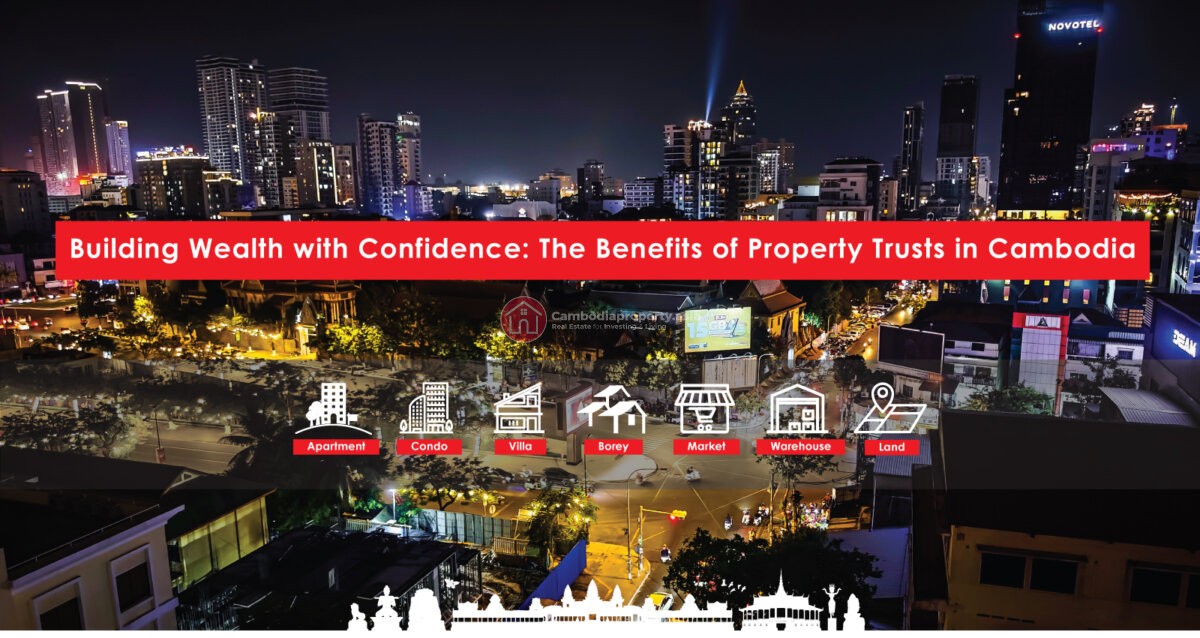
In an era of rapidly expanding economic opportunities, Cambodia stands out as a nation poised for tremendous growth. With its vibrant real estate sector and increasingly favorable investment landscape, the country is becoming an attractive destination for investors looking to diversify their portfolios. Among the various wealth-building strategies available, the benefits of property trusts in Cambodia are garnering significant attention. These financial instruments are not just a vehicle for real estate investment; they offer an array of advantages that foster security, growth, and long-term financial confidence.
The Landscape of Cambodian Real Estate Investment
Cambodia has evolved from a relatively underdeveloped market into a hotbed of real estate activity. The nation’s rapid urbanization, especially in cities like Phnom Penh, Sihanoukville, and Siem Reap, has created an influx of development projects. Foreign investors are increasingly seeking opportunities in this dynamic environment. The government has also streamlined policies to encourage investment, including property ownership rights for foreign nationals under certain conditions.
But, amidst these burgeoning opportunities, understanding how to invest wisely becomes paramount. Enter property trusts, a powerful tool that provides a structured and secure way to tap into the Cambodian real estate market. The benefits of property trusts in Cambodia offer unique appeal for both local and international investors.
What Are Property Trusts?
Property trusts, also known as real estate investment trusts (REITs), are companies that own or finance income-producing real estate across a range of sectors. They allow investors to pool their capital, thereby providing access to properties or projects that would otherwise be beyond their financial reach. This collective approach reduces risk while offering high returns from real estate assets like commercial buildings, hotels, retail centers, and even industrial complexes.
In Cambodia, where the real estate market continues to climb, property trusts present a way to gain exposure to premium assets without needing to manage or directly purchase properties. Investors can leverage the collective power of the trust while enjoying a diversified portfolio. The benefits of property trusts in Cambodia also extend far beyond financial returns—they offer flexibility, ease of access, and the potential for sustainable long-term growth.
Diversification and Risk Mitigation
One of the most compelling benefits of property trusts in Cambodia is the inherent diversification they provide. With a property trust, your investment isn’t concentrated in a single property or project. Instead, it is spread across a range of assets, reducing exposure to the risks associated with any one venture. This is especially valuable in an emerging market like Cambodia, where real estate values can fluctuate due to shifts in the local economy or geopolitical climate.
Moreover, property trusts are managed by experienced professionals who have in-depth knowledge of the market. This professional management adds another layer of security, ensuring that investors don’t need to be experts in Cambodian real estate to make profitable decisions.
Passive Income and Liquidity
Another key advantage of property trusts is the generation of passive income. Trusts typically distribute a significant portion of their profits to investors in the form of dividends. In Cambodia, where rental yields from commercial and residential properties are quite favorable, this means regular income without the day-to-day responsibilities of managing properties.
Furthermore, the benefits of property trusts in Cambodia include liquidity, which is often a concern for traditional real estate investments. Unlike direct property ownership, which can tie up capital for years, property trusts allow investors to buy and sell shares with relative ease. This liquidity makes them an attractive option for investors seeking flexibility while still enjoying the benefits of real estate.
Regulatory Advantages
Cambodia’s regulatory framework around property trusts is becoming more robust, with the government taking proactive steps to align with international standards. This development adds to the confidence investors can have in the system. Unlike other high-risk ventures, the benefits of property trusts in Cambodia include being subject to legal oversight and clear guidelines, which helps to protect investors’ interests.
The regulatory advantages also extend to taxation. In Cambodia, property trusts can offer favorable tax treatment, allowing investors to maximize their returns without the burden of heavy capital gains taxes or other levies that might apply to direct property ownership.
Long-Term Wealth Building
For investors focused on long-term wealth creation, the benefits of property trusts in Cambodia cannot be overstated. The country’s growing economy, expanding infrastructure, and increasing foreign direct investment make Cambodian real estate a promising sector for years to come. Property trusts provide a reliable means of capitalizing on this growth with minimal risk.
Furthermore, as Cambodia continues to develop its financial markets and introduce more sophisticated investment vehicles, the potential for property trusts to generate sustained returns is likely to increase. For investors seeking both stability and growth, this is a golden opportunity.
Conclusion
Investing in property trusts offers a gateway to the thriving Cambodian real estate market without the complexities or risks of direct ownership. The benefits of property trusts in Cambodia are clear: they offer diversification, passive income, liquidity, and regulatory protection—all within an emerging economy with significant growth potential. As Cambodia continues its upward trajectory, these financial instruments provide a pathway to building wealth with confidence.



